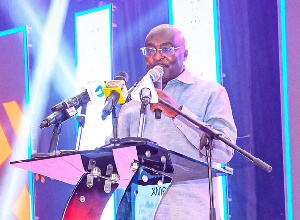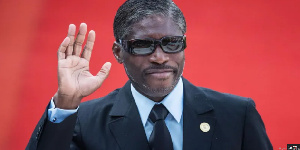General News of Sunday, 12 July 2020
Source: www.ghanaweb.live
2020-07-12Prof Stephen Kwaku Asare sues AG over Domelevo’s accumulated leave saga
 Daniel Yaw Domelevo was asked by the to proceed on leave
Daniel Yaw Domelevo was asked by the to proceed on leave
Prof. Stephen Kwaku Asare, aka Kwaku Azar, has sued the Attorney-General (AG), seeking to set aside the Auditor-General's 167 days accumulated leave which started on July 1, 2020.
He wants the Supreme Court to rule that the directive by the president is inconsistent with the letter and spirit of Article 187(7)(a) of the 1992 Constitution of the Republic of Ghana.
Together with the
Read full article.AG as defendants are the office of the Auditor-General and Johnson Akuamoah who is acting as Auditor-General.
Kwaku Azar, who has publicly described the president’s directive as unconstitutional, stated that the office of the Auditor-General is important in the governance system of the country and should therefore not be toyed with.
He explained that an annual leave is an entitlement of the employee and cannot be forced on him by an employer.
Kwaku Azar further explained that the directive by the presidency amounts to constructive removal which the courts must remedy.
He cited Section 20(1) of the Labour Act, 2003 (Act 651) which reads “Every worker is entitled to not less than fifteen working days leave with full pay in any calendar year of continuous service.” He then cemented his argument with section 31 of the same Act which reads: “any agreement to forgo such leave is void”.
Portions of the writ reads; “Even though disguised as a directive to take accumulated annual leave of 167 days, the directive is actually a suspension of the Auditor-General who is being asked to pay for the suspension by a forced debit to his accrued vacation account.”
Prof Asare stated further that the acting Auditor-General, Johnson Asiedu Akuamoah has not taken the Oath of the Auditor-General and cannot be referred to as acting in that position when there is a substantive A-G.
Reliefs from the court
Prof Kwaku Asare wants the Supreme Court to declare that except for stated grounds in Article 146 of the 1992 Constitution, the Auditor-General’s tenure cannot be disturbed by Presidential directives, whether couched as accumulated leave, involuntary leave, suspension, interdiction, temporary removal, disciplinary control, or however styled, and he may remain in office until he attains the compulsory retirement age of 60.
He also wants the court to declare that the President’s directive to the Auditor-General to hand over all matters relating to his office to Mr. Johnson Akuamoah Asiedu is inconsistent with or is in contravention with the letter and spirit of Articles 187(1) and 187(7)(a) of the Constitution, 1992.
A declaration that the President’s appointment of Johnson Akuamoah Asiedu to act as the Auditor-General is inconsistent with or is in contravention of the letter and spirit of Articles 187(1), 187(7)(a).
An order directing the President, his agents, assigns, privies, servants and whomsoever of whatever description to cease and desist from issuing directives to the Auditor-General.
An order directing the President, his agents, assigns, privies, servants and whomsoever of whatever description to cease and desist from exercising disciplinary control over the Auditor-General.
An order directing the President, his agents, assigns, privies, servants and whomsoever of whatever description to cease and desist from assessing the work, including the financial administration, of the Auditor-General.
An order directing the Auditor-General to resume performing his constitutional functions.
An order directing Johnson Akuamoah Asiedu to cease and desist from performing the role of an Acting Auditor-General.
An order invalidating any decisions taken by Mr Akuamoah Asiedu subject to ratification by the Auditor-General.
An order of interlocutory injunction to restrain Mr. Johnson Akuamoah Asiedu from performing the functions of Acting Auditor-General, pending the final determination of the substantive suit.
An expedited hearing of the motion for injunction and the substantive cause given the important financial watchdog role played by the Auditor-General and the irreparable harm that any delay will cause to the financial systems and the integrity of the Constitution.
Any other reliefs that this Court deems necessary in the exercise of its legal and equitable powers. Cost for court expenses and legal service fees.










